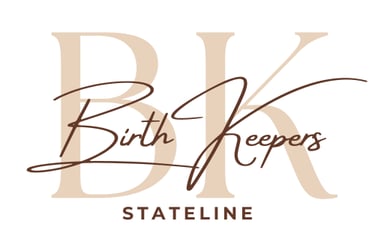Bonding With Your Child
Blog post description.
1/20/20252 min read


Bonding with your child during infancy, toddlerhood, & preschool is incredibly important for building a strong, trusting relationship that supports their emotional & developmental growth.
Infancy
1. Eye Contact & Cuddling: Newborns thrive on physical closeness. Hold your baby close, make eye contact, & offer lots of skin-to-skin contact to help them feel safe & loved.
2. Talk & Sing to Your Baby: Even though they can’t talk back, babies love hearing your voice. Talk to them throughout the day, narrating what you're doing, & sing lullabies or simple songs to soothe them.
3. Responsive Caregiving: Responding to your baby’s needs—whether it's feeding, comforting, or changing—helps build trust. When your baby cries & you comfort them, they feel secure & loved.
4. Tummy Time & Play: Gently encourage tummy time, which helps with physical development, while also making it a bonding experience with toys or even your face as their focal point.
5. Gentle Touch: Massages & gentle touches are calming for babies & reinforce the feeling of security & love.
Toddlerhood
1. Play Together: At this stage, toddlers start exploring the world through play. Get down on their level & engage in their imaginative games or simple activities like stacking blocks, drawing, or playing with dolls or cars.
2. Routine & Consistency: Toddlers love routines. Having regular, predictable activities (like bedtime rituals, meals, & playtime) fosters a sense of safety & connection.
3. Praise & Encouragement: Celebrate their little victories (like learning to walk or talk). Positive reinforcement builds self-esteem & strengthens your bond.
4. Read Together: Reading aloud to your toddler supports their language development & also creates special moments of connection. Let them choose their favorite books & be involved in pointing at pictures or turning pages.
5. Physical Affection: Toddlers may start becoming more independent, but they still need plenty of hugs, kisses, & snuggles. Physical affection reassures them of your love & support.
Preschool
1. Engage in Their Imaginary Play: Preschoolers love pretending. Enter their world of make-believe by playing along with their ideas—whether they’re pretending to be superheroes, animals, or running a “store.” This deepens emotional bonding.
2. Explore Together: Take walks, go on nature hikes, or visit parks. Sharing new experiences helps foster a sense of adventure & connection. Ask questions, share observations, & encourage curiosity.
3. Have Conversations: Preschoolers begin to have more meaningful conversations. Ask about their day, their thoughts, or their feelings. Validate their emotions & give them your full attention when they speak.
4. Create Art Together: Drawing, painting, or crafting are fun ways to bond with your preschooler. Let them guide the project & be involved in the process rather than just focusing on the end result.
5. Show Empathy: Start teaching empathy by labeling & discussing emotions together. Acknowledge when they’re upset or excited & show that you understand their feelings. This builds emotional security & trust.
Bonding Across All Stages:
BE PRESENT: Try to be fully present when spending time with your child, whether you’re playing, reading, or just hanging out. Limit distractions like phones or TV.
GIVE THEM ATTENTION: Even a few minutes of focused, undivided attention can make a big difference in a child’s sense of security & connection.
CREATE SHARED TRADITIONS: Small, consistent traditions, whether it’s a special goodnight ritual or a weekend breakfast together, can help deepen your bond & give your child something to look forward to.
Bonding takes time & patience, but the love & security you provide will lay a strong foundation for your child’s emotional & social growth. Each stage offers unique opportunities to connect, so cherish these moments as they grow!
Let's talk
statelinebirthkeepers@gmail.com
Give us Text: 815-513-2482


